New Data on the Racial Gap in College Graduation Rates
 The U.S. Department of Education recently released data on the success rate of the cohort of students who entered higher education in the fall of 2003. For all students who enrolled in any type of postsecondary educational institution in 2003, 36.4 percent of whites earned a bachelor’s degree by 2009. This was more than double the rate for blacks. Only 16.7 percent of blacks who entered postsecondary education in 2003 earned a bachelor’s degree by 2009. Another 10.2 percent of whites and 7.6 percent of blacks had earned two-year associate’s degree by 2009. The U.S. Department of Education recently released data on the success rate of the cohort of students who entered higher education in the fall of 2003. For all students who enrolled in any type of postsecondary educational institution in 2003, 36.4 percent of whites earned a bachelor’s degree by 2009. This was more than double the rate for blacks. Only 16.7 percent of blacks who entered postsecondary education in 2003 earned a bachelor’s degree by 2009. Another 10.2 percent of whites and 7.6 percent of blacks had earned two-year associate’s degree by 2009.
If we look only at students who entered public, four-year institutions in 2003, 62.0 percent of whites went on to earn a bachelor’s degree by 2009. For blacks, 46.7 percent of all students who entered four-year institutions in 2003 were awarded a bachelor’s degree by 2009.
At private, four-year institutions, 70.3 percent of whites who matriculated in 2003 went on to earn a bachelor’s degree by 2009. For blacks at four-year, private colleges and universities, 45.6 percent of all students who entered in 2003 earned a bachelor’s degree by 2009.
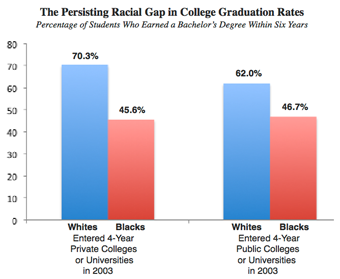
Mark G. Hardy Named Provost at Jackson State University
 Jackson State University, the historically black educational institution in Mississippi, has announced the appointment of Mark G. Hardy as university provost. Dr. Hardy has been serving as dean of the College of Science, Engineering, and Technology at Jackson State. He has served on the faculty at the university for nearly 25 years. Jackson State University, the historically black educational institution in Mississippi, has announced the appointment of Mark G. Hardy as university provost. Dr. Hardy has been serving as dean of the College of Science, Engineering, and Technology at Jackson State. He has served on the faculty at the university for nearly 25 years.
Dr. Hardy holds bachelor’s and master’s degrees from Jackson State University. He earned a Ph.D. in phycology, the study of algae, at the University of Alabama. He did postdoctoral research in plant and soil science at Alabama A&M University.

WOODROW WILSON INTERNATIONAL CENTER FOR SCHOLARS

Fellowships at the Woodrow Wilson Center
The Woodrow Wilson International Center for Scholars is pleased to announce the opening of its 2012-2013 Fellowship competition. The Center awards approximately 20-25 academic year residential fellowships to individuals from any country with outstanding project proposals on national and/or international issues. The Center accepts non-advocacy, policy-relevant, fellowship proposals that address key challenges of past, present, and future issues confronting the United States and the world. Applicants must hold a doctorate or have equivalent professional experience. The Center also supports projects that intersect with contemporary policy issues and provide the historical and/or cultural context for some of today's significant public policy issues.
Fellows are provided stipends (which include round trip travel), private offices, Windows based personal computers, loan privileges with the Library of Congress, and part-time research assistants.
For more information and application guidelines please contact the Center at:
Tel: 202-691-4170; Fax: 202-691-4001; Email: fellowships@wilsoncenter.org.
You can apply online or download the application from the Center's website at http://www.wilsoncenter.org/fellowshipapplication/
Deadline: October 1, 2011

Temple University Study Dispels the Stereotype of the Widespread Misuse of Prescription Drugs by Low-Income African Americans
 Research has shown that large numbers of Americans “borrow” prescription drugs from family members or friends. It has been assumed that the abuse of prescription drugs is more commonplace among low-income and minority patients because these groups tend to have lower levels of insurance coverage and other factors. Research has shown that large numbers of Americans “borrow” prescription drugs from family members or friends. It has been assumed that the abuse of prescription drugs is more commonplace among low-income and minority patients because these groups tend to have lower levels of insurance coverage and other factors.
But new research from scholars at Temple University has found that the rate of borrowing prescription drugs in low-income groups is no greater than in other segments of the population. In a study of low-income patients in Philadelphia, of which 75 percent were African Americans, the research found that 18 percent reported using drugs that were prescribed for another person. This is similar to the rates for the population as whole, as found in previous research.
Two Atlanta HBCUs Participating in Major Robotics Research
 Spelman College and Morehouse College, two historically black educational institutions in Atlanta, are participating in a five-year, $18.5 million grant program to work on robotic devices that interface with the human nervous system. The Center for Sensorimotor Neural Engineering at the University of Washington is leading the mult-institution consortium working on the National Science Foundation grant program. Spelman College and Morehouse College, two historically black educational institutions in Atlanta, are participating in a five-year, $18.5 million grant program to work on robotic devices that interface with the human nervous system. The Center for Sensorimotor Neural Engineering at the University of Washington is leading the mult-institution consortium working on the National Science Foundation grant program.
The goal of the program is to develop new technologies to help people with spinal cord injuries, cerebral palsy, or sufferers of stroke or Parkinson’s disease.
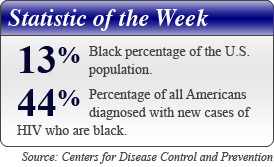
Historically Black Dillard University and Texas Chiropractic College Form an Educational Alliance
 Dillard University, the historically black educational institution in New Orleans, has entered into a partnership agreement with Texas Chiropractic College in Pasadena, Texas, near Houston. Dillard University, the historically black educational institution in New Orleans, has entered into a partnership agreement with Texas Chiropractic College in Pasadena, Texas, near Houston.
 Under the agreement, students will study for three years at Dillard University. Those that have performed up to academic standards will then transfer to Texas Chiropractic College for three additional years of study. Students who complete the program will receive a bachelor’s degree from Dillard and a chiropractic doctorate from Texas Chiropractic College. Under the agreement, students will study for three years at Dillard University. Those that have performed up to academic standards will then transfer to Texas Chiropractic College for three additional years of study. Students who complete the program will receive a bachelor’s degree from Dillard and a chiropractic doctorate from Texas Chiropractic College.
Currently, about 16 percent of the students at Texas Chiropractic College are African Americans.
The Princeton Review’s Survey of Race Relations on Campus
 The Princeton Review has released its annual rankings of the 376 best colleges in America. Included in the book are surveys conducted of students at the selected colleges and universities. The Princeton Review has released its annual rankings of the 376 best colleges in America. Included in the book are surveys conducted of students at the selected colleges and universities.
Each year, the Princeton Review ranks the schools on race relations on campus. The schools that students said had a lot of interracial interaction were Loyola University of New Orleans, Stanford University, the University of Miami, Franklin W. Olin College of Engineering, and the University of Alabama Birmingham.
The schools where surveyed students said that there was a low level of interaction between students of different races were Providence College, the University of New Hampshire, Fairfield University, Trinity College (Connecticut), and Boston College.
Of note is the fact that all of the schools that surveyed students said had the least racial interaction are in New England.

THE UNIVERSITY AT ALBANY –
STATE UNIVERSITY OF NEW YORK

Tenure-Track Position in Criminal Justice
The School of Criminal Justice invites applications for a full-time tenure-track faculty position, at the Assistant or Associate level, to begin Fall 2012. Area of specialization is open. A Ph.D. in criminal justice or a related discipline is required, and candidates must have a demonstrated potential for excellence in teaching and research.
The School of Criminal Justice has an internationally renowned doctoral program, offers a small MA program, and provides a select group of undergraduates the opportunity to earn the BA in criminal justice. The University at Albany is one of the four University Centers of the State University of New York. Its approximately 17,000 students include some 5000 graduate students, and its full-time faculty numbers about 700. Albany, the capital of New York, is in a metropolitan area with a population of approximately 800,000. Located in beautiful upstate New York, it is in close proximity to the Berkshires, the Catskills, the Adirondacks, and the Hudson River Valley and is also convenient to Boston, Montreal, and New York City.
Applicants should apply online. Applicants must submit a letter of application, statement of research and teaching interests, curriculum vitae, and the names and contact information of three references. Review of applications will begin September 15 and will continue until the position is filled. Position is contingent upon funding availability.
The University at Albany is an EEO/AA/IRCA/ADA employer.
Apply Here: http://www.Click2Apply.net/7fwzbkf

Recent Books That May Be of Interest to African-American Scholars
 The JBHE Weekly Bulletin regularly publishes a list of new books that may be of interest to our readers. Here are the latest selections. The JBHE Weekly Bulletin regularly publishes a list of new books that may be of interest to our readers. Here are the latest selections.
• African American Children and Mental Health edited by Nancy E. Hill et al. (Praeger Publishers)
• Black in Latin America by Henry Louis Gates Jr. (New York University Press)
• Bully Mother: The Story of Oumou Traore by Oumou Traore (AuthorHouse)
• Contesting Slavery: The Politics of Bondage and Freedom in the New American Nation by John Craig Hammond and Matthew Mason (University of Virginia Press)
• Fatal Invention: How Science, Politics and Big Business Re-Create Race in the Twenty-First Century by Dorothy Roberts (The New Press)
• Hollywood’s African American Films: The Transition to Sound by Ryan Jay Friedman (Rutgers University Press)
• Marching with Dr. King: Ralph Helstein and the United Packinghouse Workers of America by Cyril Robinson (Praeger Publishers)
• Multicultural Student Services on Campus: Building Bridges, Revisioning Community edited by Dafina Lazarus Stewart (Stylus Publishing)
• No Man’s Land: Jamaican Guestworkers in America and the Global History of Deportable Labor by Cindy Hahamovitch (Princeton University Press)
• Race in American Science Fiction by Isiah Lavender (Indiana University Press)
• Rosa Parks: A Biography by Joyce A. Hanson (Greenwood Press)
• The Anti-Slavery Project: From the Slave Trade to Human Trafficking by Joel Quirk (University of Pennsylvania Press)
• Through the Storm, Through the Night: A History of African American Christianity by Paul Harvey (Rowman & Littlefield)
• Two Centuries of Black Louisville: A Photographic History by Mervin Aubespin et al. (Butler Books)
Honors and Awards
 • Alexander G. Clark Sr. was inducted posthumously into the Iowa African-American Hall of Fame. In 1867, more than 85 years before Brown v. Board of Education, Clark successfully filed suit to gain admittance of his daughter to the racially segregated public schools. He later successfully fought to have his son admitted to the law school at the University of Iowa. In 1879, his son became the first African-American graduate of the school. Five years later, Alexander Sr. was the second African-American graduate of the law school The father/son pair practiced law together in Iowa and Illinois. • Alexander G. Clark Sr. was inducted posthumously into the Iowa African-American Hall of Fame. In 1867, more than 85 years before Brown v. Board of Education, Clark successfully filed suit to gain admittance of his daughter to the racially segregated public schools. He later successfully fought to have his son admitted to the law school at the University of Iowa. In 1879, his son became the first African-American graduate of the school. Five years later, Alexander Sr. was the second African-American graduate of the law school The father/son pair practiced law together in Iowa and Illinois.
In 1890, Alexander was named U.S. minister to Liberia. He died in Africa while serving his country a year later.
 • Lovell A. Jones, professor at the M.D. Anderson Cancer Center and director of the Center for Research on Minority Health at the University of Texas in Houston and professor at the University of Houston, was selected to receive the Ruth Kirschstein Diversity in Science Award. He will receive the honor at the annual meeting of the American Society for Biochemistry and Molecular Biology in San Diego in April. • Lovell A. Jones, professor at the M.D. Anderson Cancer Center and director of the Center for Research on Minority Health at the University of Texas in Houston and professor at the University of Houston, was selected to receive the Ruth Kirschstein Diversity in Science Award. He will receive the honor at the annual meeting of the American Society for Biochemistry and Molecular Biology in San Diego in April.
Dr. Jones holds a Ph.D. in zoology from the University of California at Berkeley.
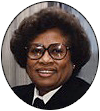 • Joycelyn Elders, the former Surgeon General of the United States and currently professor emerita at the University of Arkansas for Medical Sciences, will be honored by the establishment of an endowed chair at the University of Minnesota Medical School. The Jocelyn Elders Chair in Sexual Health Education is being established, in part, with funds from Adam & Eve, a company which sells sex toys, exotic lingerie, and other adult products. • Joycelyn Elders, the former Surgeon General of the United States and currently professor emerita at the University of Arkansas for Medical Sciences, will be honored by the establishment of an endowed chair at the University of Minnesota Medical School. The Jocelyn Elders Chair in Sexual Health Education is being established, in part, with funds from Adam & Eve, a company which sells sex toys, exotic lingerie, and other adult products.
Grants and Gifts
• Historically black Fisk University in Nashville, Tennessee, is participating in a $900,000 U.S. Energy Department grant program with Wake Forest University. The researchers are developing crystals that can detect nuclear threats, radioactive materials, or chemical bombs more accurately and more cost-effectively than present detection methods.
• The University of Illinois at Chicago received a five-year, $3 million grant from the National Institutes of Health for a program to improve diabetes management among black and Latino patients.
|
The Racial Wealth Gap Is Growing: College Access for African Americans at Risk
Severely restraining the ability of blacks to pay for college is the fact that, for the past 40 years, black family income has held steady at about 60 percent of median white family income. This large and unyielding gap is a huge barrier to blacks who seek education beyond high school.
A far more important statistic for measuring the ability to finance the cost of higher education is family wealth. Family assets such as stocks, bonds, money in the bank, and real estate produce interest, dividends, or rental income which are commonly used to offset or pay college costs. Wealth also includes the value of a family’s home. This important asset can be sold or borrowed against to provide funds for college expenses.
The wealth gap between black and white families has been huge. Typically, over the past generation white families have had wealth that was 10 times that of black families.
A new study from the Pew Research Center shows that during the recent recession, the wealth gap has grown even wider. In 2009 the average white family had had a median net worth of $113,149. The average black family had a median net worth of only $5,677. Since 2005 the median net worth of black families had dropped by more than 50 percent. In 2009 the average white family had a net worth that was almost 20 times greater than the median net worth of black families.
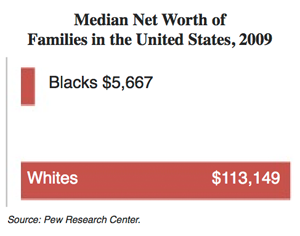
With sharp rises in tuition at many state-operated colleges and universities, the growing racial wealth gap will undoubtedly result in the inability of many black students to afford a college education.
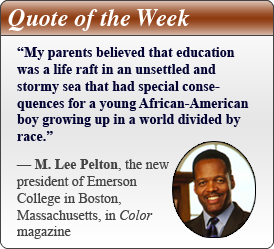
Historical Documents Relating to the African Americans of Chicago Will Be Made Available Online
The historical collections of 14 museums in the Chicago area will be digitized and made available online through what will be called the Chicago Portal. The new effort to make the collections of the 14 museums more accessible to the public is financed by a grant from the Andrew W. Mellon Foundation.
Included among the historical documents that will be available at the new portal are special collections from the libraries of the University of Chicago, Columbia College, DePaul University, Northwestern University, the University of Illinois at Chicago.
Readers of JBHE will be particularly interested in the fact that included among the collections will be the Chicago Jazz Archive, the Ida B. Wells-Barnett Collection and the papers of several University of Chicago sociologists who conducted extensive surveys and studies of the city’s ethnic populations.
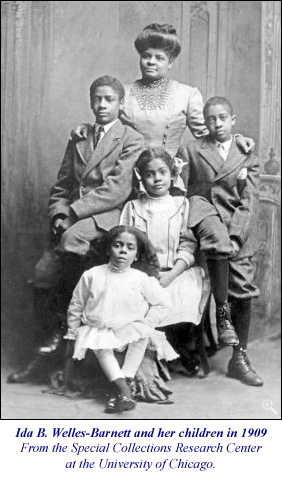

PRINCETON UNIVERSITY

Fellowships, Program in Law and Public Affairs
PRINCETON UNIVERSITY’S PROGRAM IN LAW AND PUBLIC AFFAIRS (LAPA) invites outstanding faculty, independent scholars, lawyers, and judges to apply for appointments as resident Fellows for the academic year 2012-2013. We anticipate naming up to five Fellows who are engaged in substantial research on topics broadly related to law and public affairs or law and normative inquiry, including one Microsoft/LAPA Fellow specializing in intellectual property or the legal regulation of the economy. Successful candidates will devote an academic year in residence at Princeton to research, discussion, and scholarly collaboration. Applicants must have a doctorate, JD or an equivalent professional postgraduate degree. Further information can be found at
The application deadline is 5:00 PM (EST) MONDAY, NOVEMBER 7, 2011
For more information and to apply online, visit the LAPA website at http://lapa.princeton.edu/howtoapply.php.
Princeton University is an equal opportunity employer and complies with applicable EEO and affirmative action regulations.
LAPA is co-sponsored by the Woodrow Wilson School of Public and International Affairs, the University Center for Human Values, and Princeton University
Further information can be found at http://lapa.princeton.edu/fellowships.php

Shaw University Chooses New Leader
 Dorothy Cowser Yancy was named interim president of Shaw University in Raleigh, North Carolina. Irma McClaurin, the former president, resigned last week and published reports suggested that she was forced out by the university’s board of trustees. Yancy has agreed to serve as interim president for up to two years while the university finds a permanent successor for Dr. McClaurin. Dorothy Cowser Yancy was named interim president of Shaw University in Raleigh, North Carolina. Irma McClaurin, the former president, resigned last week and published reports suggested that she was forced out by the university’s board of trustees. Yancy has agreed to serve as interim president for up to two years while the university finds a permanent successor for Dr. McClaurin.
Dr. Yancy served for 14 years as president of Johnson C. Smith University in Charlotte, North Carolina. She was interim president of Shaw University from June 2009 until September 2010, when McClaurin was named president.
A native of Alabama, Dr. Yancy is an alumna of Johnson C. Smith University. She holds a master’s degree in history from the University of Massachusetts and a Ph.D. in political science from Atlanta University.
In Memoriam
Melvin B. Tolson Jr. (1923-2011)
 Melvin B. Tolson Jr., the first African American to earn a master’s degree at Oklahoma State University and the first full-time African-American faculty member at the University of Oklahoma, has died at the age of 88. Melvin B. Tolson Jr., the first African American to earn a master’s degree at Oklahoma State University and the first full-time African-American faculty member at the University of Oklahoma, has died at the age of 88.
Tolson was the son of Melvin B. Tolson Sr., the faculty adviser of the all-black debate team at Wiley College in Texas. Denzel Washington played the elder Tolson in the movie, The Great Debaters.
Tolson Jr. graduated from Wiley College in 1940. After earning his master’s degree at Oklahoma State in 1950 he entered the doctoral program at the University of Oklahoma in 1957 and was hired to teach French two years later. He taught at the university for 31 years.
Richard David Morrison (1908-2011)
 Richard David Morrison, former president of historically black Alabama A&M University, died late last month at the age of 103. Richard David Morrison, former president of historically black Alabama A&M University, died late last month at the age of 103.
Morrison was a 1931 graduate of Tuskegee University. He then joined the faculty at Alabama A&M and chaired the agricultural department there for 25 years. He took leave to earn a master’s degree at Cornell University and a doctorate at Michigan State University.
Dr. Morrison was named president of Alabama A&M in 1962. He served in that capacity for 22 years. He was the author of The History of Alabama A&M University and the autobiographical Walking in the Wilderness.
Oscar A. Rogers Jr. (1929-2011)
 Oscar A. Rogers Jr. the seventh president of historically black Claflin University in Orangeburg, South Carolina, died late last month at a hospital in Jackson, Mississippi. He was 82 years old. Oscar A. Rogers Jr. the seventh president of historically black Claflin University in Orangeburg, South Carolina, died late last month at a hospital in Jackson, Mississippi. He was 82 years old.
Rogers was a native of Natchez, Mississippi. He was a graduate of Tougaloo College. He earned a second bachelor’s degree at Harvard Divinity School and later was awarded a master’s degree from Harvard University and an educational doctorate from the University of Arkansas.
Prior to being named president of Claflin in 1984, he served for nearly a quarter century as a professor and dean at Jackson State University in Mississippi. Dr. Rogers served as Claflin president until 1994. During his tenure, enrollments increased by 50 percent and he was instrumental in strengthening the university’s financial stability.
Appointments, Promotions, and Resignations
 • Esther S. Powell, director of nontraditional adult student services at Winston-Salem State University in North Carolina, was elected vice president of the Alpha Sigma Lambda Society. • Esther S. Powell, director of nontraditional adult student services at Winston-Salem State University in North Carolina, was elected vice president of the Alpha Sigma Lambda Society.
The society which honors adult students who achieved high academic standards while maintaing responsibilities outside of academia, has more than 300 chapters nationwide. The society is headquartered at Eastern Illinois University in Charleston.
 • Kim Luckes was named executive vice president and chief operating officer at Norfolk State University in Virginia. For the past year, Luckes has served as acting president of the university. Previously, she was assistant to the president and liaison to the university’s board of visitors. Prior to coming to Norfolk State, she served as provost at St. Augustine’s College in Raleigh, North Carolina, and at Hampton University in Virginia. • Kim Luckes was named executive vice president and chief operating officer at Norfolk State University in Virginia. For the past year, Luckes has served as acting president of the university. Previously, she was assistant to the president and liaison to the university’s board of visitors. Prior to coming to Norfolk State, she served as provost at St. Augustine’s College in Raleigh, North Carolina, and at Hampton University in Virginia.
Luckes is a graduate of Elizabeth City State University and the North Carolina Central University School of Law.
 • Lee H. Melvin was named associate vice provost for enrollment at Cornell University. He will take his new position in September. He has been serving as vice president for enrollment planning and management at the University of Connecticut. Previously, he has held admissions positions at the University of Michigan, the University of Georgia, the University of Wisconsin, and Wayne State University. • Lee H. Melvin was named associate vice provost for enrollment at Cornell University. He will take his new position in September. He has been serving as vice president for enrollment planning and management at the University of Connecticut. Previously, he has held admissions positions at the University of Michigan, the University of Georgia, the University of Wisconsin, and Wayne State University.
Melvin orginially planned on a career in opera. He earned a bachelor of music education degree at Houston Baptist University and a master of music degree from the University of Michigan.
 • William E. Hudson Jr. was appointed vice president for student affairs at Florida A&M University in Tallahassee. He has been serving as an adjunct professor at the university and as a consultant to college and universities on minority recruitment. • William E. Hudson Jr. was appointed vice president for student affairs at Florida A&M University in Tallahassee. He has been serving as an adjunct professor at the university and as a consultant to college and universities on minority recruitment.
Dr. Hudson holds bachelor’s and master’s degrees from Florida A&M. He earned a Ph.D. in rehabilitation counseling at Florida State University.
 • Mohammed Ali Pate, an adjunct professor at the Duke University Global Health Institute, was named minister of state for health for the nation of Nigeria. • Mohammed Ali Pate, an adjunct professor at the Duke University Global Health Institute, was named minister of state for health for the nation of Nigeria.
Dr. Pate is a medical doctor and holds an MBA from the Fuqua School of Business at Duke University.
 • Harry W. Downes Jr. is the new director of the department of public safety and chief of university police at Delaware State University in Dover. He served for 26 years as an officer of the Delaware State Police. • Harry W. Downes Jr. is the new director of the department of public safety and chief of university police at Delaware State University in Dover. He served for 26 years as an officer of the Delaware State Police.
Downes holds bachelor’s and master’s degrees from Wilmington University.
 • Timothy E. Sams was named vice president for student life at Rensselaer Polytechnic Institute in Troy, New York. Since 2010 he was associate dean of students at the Abu Dhabi campus of New York University. Previously he was assistant dean and director of the Black Cultural Center at Swarthmore College. • Timothy E. Sams was named vice president for student life at Rensselaer Polytechnic Institute in Troy, New York. Since 2010 he was associate dean of students at the Abu Dhabi campus of New York University. Previously he was assistant dean and director of the Black Cultural Center at Swarthmore College.
Dr. Sams is a graduate of Union College in Schenectady, New York. He holds a master’s degree in Africana studies from SUNY-Albany and a Ph.D. from Temple University.
 • Gwendolyn Hall was promoted to vice president and academic operations officer at the American Public University in Charles Town, West Virginia. She has been serving as dean of the School of Security and Global Studies. She joined the university’s faculty in 2005 after teaching at the U.S. Air Force Academy, working at the Pentagon, and as a staff member for the Select Committee on Homeland Security of the U.S. House of Representatives. • Gwendolyn Hall was promoted to vice president and academic operations officer at the American Public University in Charles Town, West Virginia. She has been serving as dean of the School of Security and Global Studies. She joined the university’s faculty in 2005 after teaching at the U.S. Air Force Academy, working at the Pentagon, and as a staff member for the Select Committee on Homeland Security of the U.S. House of Representatives.
Dr. Hall holds bachelor’s, master’s, and Ph.D. degrees from the University of Maryland.
|
 .
.